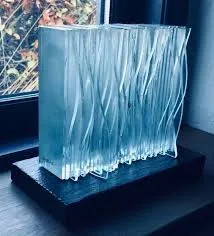The Fascinating World of Annealed and Tempered Glass
Glass is an extraordinary material that has been used for centuries in various applications, ranging from architecture to everyday household items. Among the different types of glass, annealed and tempered glass stand out due to their unique manufacturing processes and physical properties. Understanding these two types of glass and their applications can provide valuable insights into their roles in modern design and safety.
What is Annealed Glass?
Annealed glass is the most basic form of glass that is produced by gradually cooling down molten glass after it has been formed. This process is called annealing, and it helps to relieve internal stresses that may have developed during the manufacturing process. The controlled cooling allows the glass to maintain uniform thickness and clarity while minimizing the risk of breakage due to thermal stress.
Annealed glass is widely used in applications where strength is not of utmost concern. It finds its place in windows, mirrors, and other household items. Its lower cost compared to other types of glass makes it an attractive option for many builders and designers. However, it is important to note that while annealed glass is suitable for various purposes, it is less durable than tempered glass and can break into large, sharp shards that pose safety risks.
The Process of Tempering Glass
Tempered glass, on the other hand, undergoes a more rigorous manufacturing process that significantly enhances its strength and safety. The tempering process involves heating the glass to a temperature of about 620 to 650 degrees Celsius (1148 to 1202 degrees Fahrenheit) and then rapidly cooling it. This process creates a compressive stress on the surface of the glass, making it much more durable and able to withstand high temperatures and impact forces.
annealed tempered glass
One of the unique features of tempered glass is its ability to break into small, blunt pieces rather than sharp shards, reducing the risk of injury. This makes tempered glass an ideal choice for applications where safety is critical, such as in shower doors, glass doors and tables, and in buildings with large expanses of glass. Moreover, tempered glass can be up to five times stronger than annealed glass of the same thickness, providing an added layer of security and durability.
Applications of Annealed and Tempered Glass
Both annealed and tempered glass have their specific applications based on their properties. Annealed glass is commonly used in situations where safety is not a primary concern, such as in interior design elements, picture frames, and decorative glass panels. It is also often used for single-pane windows in residential buildings.
Conversely, tempered glass is preferred in areas where safety and strength are paramount. For instance, in modern architecture, tempered glass is used in facades, skylights, and curtain walls to provide aesthetic appeal while ensuring safety and durability. In addition, it is widely used in automobiles for both side and rear windows due to its ability to withstand impacts.
The Future of Glass Technology
As technology continues to advance, the production methods for both annealed and tempered glass are evolving. Innovations in glass manufacturing are leading to possibilities such as energy-efficient and smart glass, which can adapt to environmental changes. These advancements not only enhance the functional attributes of glass but also contribute to sustainable architectural designs.
In conclusion, annealed and tempered glass are two essential types of glass that serve distinct yet important roles in our daily lives. While annealed glass offers cost-effective solutions for less demanding applications, tempered glass provides unparalleled strength and safety for high-impact environments. With ongoing technological advancements, the future of glass manufacturing promises even more exciting opportunities for architects, designers, and homeowners alike. Understanding the properties and applications of these types of glass is crucial in making informed decisions for various projects, ensuring both safety and aesthetic appeal.
 Afrikaans
Afrikaans  Albanian
Albanian  Amharic
Amharic  Arabic
Arabic  Armenian
Armenian  Azerbaijani
Azerbaijani  Basque
Basque  Belarusian
Belarusian  Bengali
Bengali  Bosnian
Bosnian  Bulgarian
Bulgarian  Catalan
Catalan  Cebuano
Cebuano  Corsican
Corsican  Croatian
Croatian  Czech
Czech  Danish
Danish  Dutch
Dutch  English
English  Esperanto
Esperanto  Estonian
Estonian  Finnish
Finnish  French
French  Frisian
Frisian  Galician
Galician  Georgian
Georgian  German
German  Greek
Greek  Gujarati
Gujarati  Haitian Creole
Haitian Creole  hausa
hausa  hawaiian
hawaiian  Hebrew
Hebrew  Hindi
Hindi  Miao
Miao  Hungarian
Hungarian  Icelandic
Icelandic  igbo
igbo  Indonesian
Indonesian  irish
irish  Italian
Italian  Japanese
Japanese  Javanese
Javanese  Kannada
Kannada  kazakh
kazakh  Khmer
Khmer  Rwandese
Rwandese  Korean
Korean  Kurdish
Kurdish  Kyrgyz
Kyrgyz  Lao
Lao  Latin
Latin  Latvian
Latvian  Lithuanian
Lithuanian  Luxembourgish
Luxembourgish  Macedonian
Macedonian  Malgashi
Malgashi  Malay
Malay  Malayalam
Malayalam  Maltese
Maltese  Maori
Maori  Marathi
Marathi  Mongolian
Mongolian  Myanmar
Myanmar  Nepali
Nepali  Norwegian
Norwegian  Norwegian
Norwegian  Occitan
Occitan  Pashto
Pashto  Persian
Persian  Polish
Polish  Portuguese
Portuguese  Punjabi
Punjabi  Romanian
Romanian  Russian
Russian  Samoan
Samoan  Scottish Gaelic
Scottish Gaelic  Serbian
Serbian  Sesotho
Sesotho  Shona
Shona  Sindhi
Sindhi  Sinhala
Sinhala  Slovak
Slovak  Slovenian
Slovenian  Somali
Somali  Spanish
Spanish  Sundanese
Sundanese  Swahili
Swahili  Swedish
Swedish  Tagalog
Tagalog  Tajik
Tajik  Tamil
Tamil  Tatar
Tatar  Telugu
Telugu  Thai
Thai  Turkish
Turkish  Turkmen
Turkmen  Ukrainian
Ukrainian  Urdu
Urdu  Uighur
Uighur  Uzbek
Uzbek  Vietnamese
Vietnamese  Welsh
Welsh  Bantu
Bantu  Yiddish
Yiddish  Yoruba
Yoruba  Zulu
Zulu 

